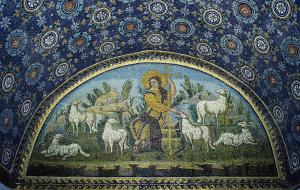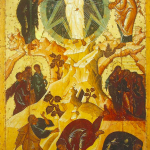
Everything God created, God created good. Existence, being created by God, therefore is good, which is why anyone who partakes of existence also has its good in them. This is one of many reasons why nothing is absolutely evil. Thus, St. Leo the Great preached:
Certainly there is no evil substance, nor is there any nature evil in itself. For the good Creator made all things good, and the Creator of all things is one, “who made the heavens and the earth, the sea, and all the things that are in them.” [1]
For evil to exist in and of itself, for evil to be absolute evil, it must have no good in it; since existence itself is good, this is impossible. Evil is not a substance, it does not exist in and of itself. Evil comes out of and thrives on the good; it takes the good and destroys it, and if it is not stopped, it would destroy all the good, leaving nothing, not even the evil itself.
What is created by God is what is good: God does not create or establish any evil, but rather, God created an order to being so that some within being would have free will, and through that freedom, they could will against their own good (or the good of others) and so do evil. Why did God do so? Because God has freedom, and so God, wanting to share the divine nature with creation, gives creation the potential to share in that freedom, not in the absolute sense God has it, but in a relative sense. God sees it is better that at least some have free will than no one has it, even if giving some in creation that good comes at a risk, the risk that those who have it will misuse or abuse it. That is, the risk that some will do evil, and in that way, “establish” evil in creation. But when such evil is willed, it does not come to be in a substantial manner; it does not create some sort of evil substance with a nature of its own, but rather, the one who wills creates the privation of some natural good, a privation which causes pain and suffering, and a privation which left to itself once it is established, will destroy that which it has corrupted. But because such evil is not substantial, it does not become a substantial part of us in such a way we identify ourselves with that substance, as St. Methodius explained:
For a man is not (spoken of as) murder, but by committing it he receives the derived name of murderer, without being himself murder; and, to speak concisely, no other evil is a substance; but by practising any evil, it can be called evil. Similarly consider, if you imagine anything else to be the cause of evil to men, that it too is evil by reason of its acting by them, and suggesting the committal of evil. For a man is evil in consequence of his actions. For he is said to be evil, because he is the doer of evil. Now what a man does, is not the man himself, but his activity, and it is from his actions that he receives the title of evil. For if we were to say that he is that which he does, and he commits murders, adulteries, and such-like, he will be all these. Now if he is these, then when they are produced he has an existence, but when they are not, he too ceases to be. Now these things are produced by men. Men then will be the authors of them, and the causes of their existing or not existing. But if each man is evil in consequence of what he practises, and what he practises has an origin, he also made a beginning in evil, and evil too had a beginning. Now if this is the case, no one is without a beginning in evil, nor are evil things without an origin.[2]
We should not essentialize evil, for when we do so, we misconstrue what is. We conceive evil as being something which it is not, and in doing so, give it more power to corrupt and destroy that which is good. For by essentializing evil, and giving a particular kind of evil a substance, we give it the good which it wants, the good which will then empower it to destroy more and often in a much swifter fashion. For, we will not be able to discern the distinction between the good which it has taken over and corrupted and the evil itself, and so when we confront the evil, we do its bidding by attacking the good as well as the evil itself. This will lead us to replace one evil with another. As God is not deceived in this fashion, as God knows the good which is there, God works to overcome the evil by taking the good which remains, separating it from the evil, and then doing what is possible to heal that good from the harm which has experienced, and in this way, God is said to be able to overcome evil with good.
This is why we should also seek to discern what good remains in the midst of evil so that we can follow God and find a way to preserve that good instead of destroying it. This is why we must be careful in how we treat others. Though they might make it difficult to be kind and merciful to them, to love them, we should realize behind all the evil they do, all the pain and misery they cause, there remains someone who has some good in them, someone who has a dignity of their own which must be preserved. We should seek after that good, acknowledge it, and help it become free from the evil in which it finds itself, so that then it not only can be preserved, but begin to heal from the damage evil has done to it. Anything else will only have us doing the work of evil ourselves, as we will use the evil we see in others as justification for their destruction, the destruction which evil itself brings to all that is good. Similarly, we can even recognize that insofar as someone has some good in them, they remain just, which is why, as Origen explained, we are to wish good for everyone, including those who despise us:
It is really quite clear that those who seek evil for the just person are not the only ones who speak vanity, but so does everyone who strives to bring evil upon anyone else. For he who seeks to do evil is not speaking the things that are according to God. And this is why we ought rather to seek what is good. If we could only return good for evil even toward those who hate us, either persuading our enemies what the good is or working to call their defiant souls back to harmony and peace, we might then become the children of the “Father who is in heaven, who commands his sun to rise upon the good and the bad and who rains upon the just and the unjust.”[3]
Wishing such good for others, even those who have done evil, does not mean we should ignore justice and its dictates. We must do what we can to properly stop evil and its growth, which is why laws can be and are necessary, so long as we enact such laws for the sake of the common good but also with a merciful mindset. Justice without mercy is not just. We might need to create general rules and regulations, but then we will have to apply them properly in a case by case basis, making sure the general rule does not itself subvert us from our proper good, which is freeing the good and helping it reestablish itself in the world. And one of the ways of justice is found in the way those who have done great evil, once they have stopped doing it, will have to make amends, that is, they will have to work to counteract the evil they have done (which is why reparations are sometimes necessary). We must, once again, do so with mercy and grace, doing what we can to help them do so. Thus, because we must work for and promote the good, we must promote justice, but justice should always be mixed with mercy and love, making sure justice remains just instead of becoming another tool of evil itself. If we do this, we will show the world we truly are children of God, for we will loving everyone, just as God loves everyone.
[1] St Leo the Great, Sermons. Trans. Jane Patricia Freeland CSJB and Agnes Josephine Conway SSJ (Washington, DC: CUA Press, 1996), 183 [Sermon 42].
[2] St. Methodius, “Concerning Free Will.” Trans. William R. Clark in ANF(6):360.
[3] Origen, Homilies on Psalms 36-38. Trans. Michael Heintz (Washington, DC: CUA Press, 2023), 192 [Homily 2, Psalm 37 [38]].
Stay in touch! Like A Little Bit of Nothing on Facebook.
If you liked what you read, please consider sharing it with your friends and family!
N.B.: While I read comments to moderate them, I rarely respond to them. If I don’t respond to your comment directly, don’t assume I am unthankful for it. I appreciate it. But I want readers to feel free to ask questions, and hopefully, dialogue with each other. I have shared what I wanted to say, though some responses will get a brief reply by me, or, if I find it interesting and something I can engage fully, as the foundation for another post. I have had many posts inspired or improved upon thanks to my readers.
















